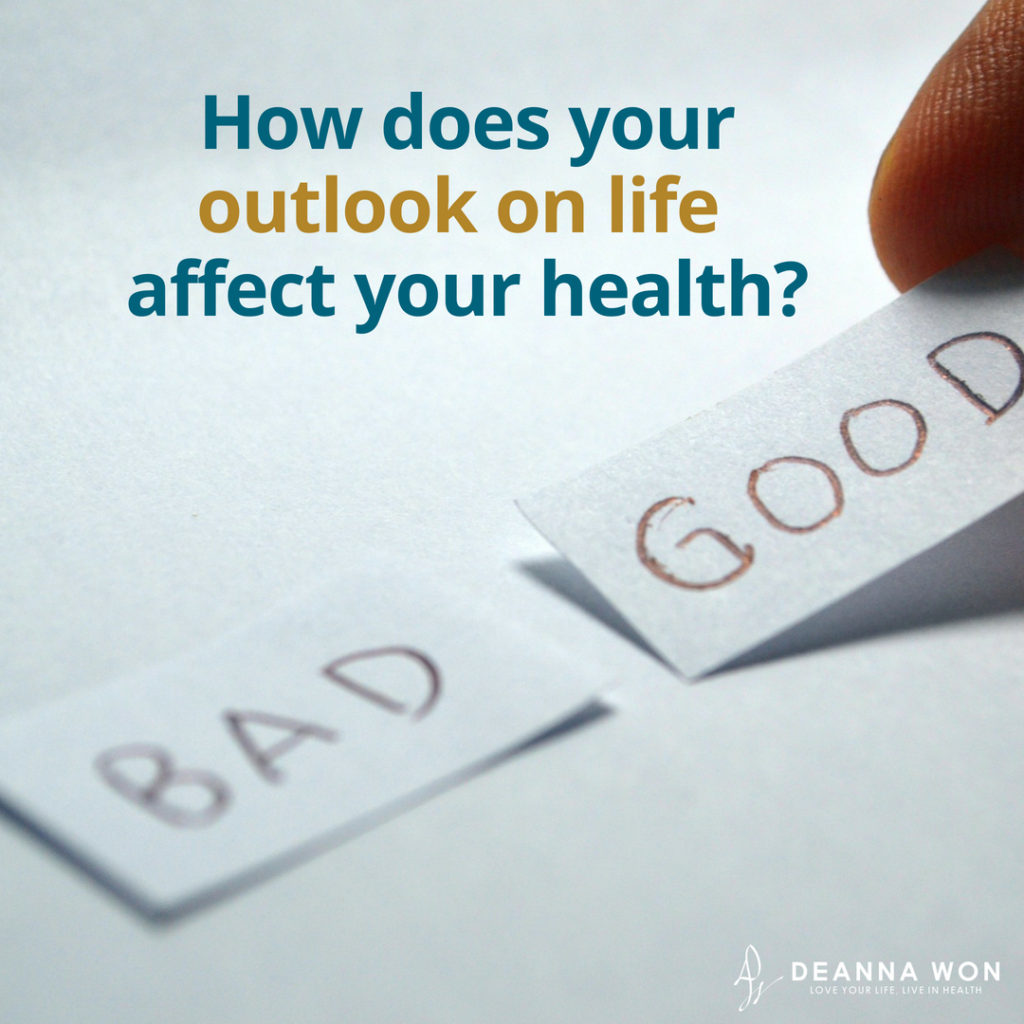What type of perspective do you generally have on life and the situations that come your way? Do you consider your circumstances as a glass-half-full or half-empty? This is an age-old question that easily lets you see how you see the world – through the lens of optimism or pessimism. Another question may be–when you take inventory of your internal thoughts, are they typically encouraging or self-critical? How you look at life can affect your ability to get a good night’s rest, maintain a healthy weight, the quality of your relationships, your social life, and even your ability to hold a job.
Those who look at life through the lens of optimism tend to be more content and have healthier lives as they often make more of an effort to maintain or improve the state of their mind, body, and spirit. On the other hand, those with more of a negative outlook tend to engage in thinking patterns and behaviors that do not support nor encourage good health.
Essentially, your overall outlook has more of an effect on your health than simply what you do for yourself on a physical level, such as what you eat and along with your physical activity. Your mental outlook also greatly impacts your body on an energetic and biochemical level, which greatly increases your risk of contracting diseases. Research has found that a negative outlook can contribute to depression, heart disease, lowered immune system function, and even cancer. Studies have associated negative emotions with higher levels of pro-inflammatory biomarkers, specifically interleukin-6 (IL-6) which has been shown to be a key player in chronic inflammation.[1],[2] As you may have read in another one my articles, Sugar: A Big & Avoidable Inflammatory Culprit, chronic inflammation is the precursor of many diseases like Alzheimer’s, cancer, diabetes, obesity, hypertension, and a host of other illnesses.
I’m sure that you’re familiar with the phrase, “anger will eat you up inside.” Studies have shown that this is actually true. However, it’s not the anger that you express; it’s the anger that you suppress. In the Psychology Today article, Anger and Cancer: Is There a Relationship?, a 1977 study by Pettingale, Greer, & Tee found that of the 160 women studied over a two year period, those who had a tendency to suppress their anger developed breast cancer and had “longitudinal patterns of increased serum Immunoglobulin A (IgA) levels (implicated in some autoimmune diseases) compared to those who did not suppress their anger.”[3] In addition to breast cancer, suppressed anger may also be linked to prostate, lung, and colorectal cancers. [4]
Additionally, negative emotions can lead to a state of chronic stress which affects your autonomic nervous system. In another one my articles, Why “Down” Time Needs to Be Built into Your Daily Schedule, I discuss how chronic stress can lead to hypertension, heart attack or stroke, caused by the continued constriction of blood vessels and elevated heart rate.
In contrast, optimists tend to have much healthier immune systems. Those with a more positive outlook on life tend to produce more of the neurotransmitter dopamine–our body’s natural “feel-good” chemical. Dopamine allows you to maintain a healthy weight (or even lose weight), improves your memory and focus, allows you to sleep better, and can lower your risk for conditions, like Parkinson’s disease.[5]
How can you improve your optimism?
- Focus on the positive. With so much negative news around us these days, sometimes it’s not very easy to see the good things that are happening all around you. Make it your mission every day to purposely seek out the good things that are happening around you. There’s always something good to see if you take the time to notice. For example, if you’re sitting in traffic, try not to focus on the fact that you’re not moving. Instead, find music to listen to in your car that can lift your mood, take notice of the weather, the landscaping, the skyline, and the people around you. You can also use this time to listen to audio books to learn something new. Or, perhaps this time can be used to focus on your own inner peace.
- Cultivate gratefulness. Gratitude is one of the best ways to increase your optimism. When you realize all of the great things that you have in your life and express gratitude for them, your outlook on life continually improves. A great way to do this is by keeping a gratitude journal. Every evening, before you go to bed, list at least 10 things or more for which you’re grateful. At times, you may not feel grateful. However, that’s when you can choose to cultivate gratefulness. Once you start with one thing that you’re grateful for, it often becomes easier to find something else for which you can express gratitude. Generating and remaining in a place of gratitude will help to bring about more peace into your life, which can also help to improve the quality of your sleep by eliminating potential reasons for waking up in the middle of the night with worry. By getting better rest, this will help you to stay alert and focused the next day, as well as help in improving your mood.
- Be complimentary. Notice the good in others and let them know about it. Your compliments can be as simple as acknowledging a new haircut or outfit, or a bit more significant like showing appreciation for the ability to do something well. There’s always something good to acknowledge in others, and it really doesn’t take much effort. Intentionally find a reason to praise everyone with whom you interact. You’ll find that this will not only affect other in a positive way, but it will also affect you and your mood for the better. Make this a practice no matter where you are during the day. In time, after practicing this regularly, you’ll find yourself transformed to be a force for that which is good and positive.
- Share your good news. Sometimes, people tend to keep their good news to themselves because they may view sharing the good in their life as being boastful. However, a 2012 published study actually shows that sharing happy events brings even more happiness and an overall increased satisfaction with life.[6] Therefore, be open to sharing your blessings, gifts, awards, and other accomplishments with your loved ones and friends, and encourage them to do the same with you. This is especially important for those who are struggling to heal from a chronic illness, like cancer. As you see progress in your healing and recovery, share and celebrate these wins, even if you may think them insignificant. Remember that sharing good news along your healing journey brings encouragement to not only yourself, but also to those around you.
- Focus on what you want, not what you don’t. The mind and our thoughts are incredibly powerful. Whatever it is that we focus on the most is what we may actually attract into our lives. Therefore, if you spend most of your mental energy focusing on what you don’t want, you may unintentionally attract that into your life. Rather than concentrating on what you don’t want, pay more attention to what you desire the most. This way, you’re able to attract more positive things into your life. For those who have recovered from a chronic illness, like cancer, rather than focusing on what you can do to avoid getting cancer, focus on living your life with purpose and that which brings you greatest joy.
If you currently have a “glass half-empty” perspective, realize that your outlook may likely not drastically change overnight. However, with some consistent practice, it’s possible to make the change to a more optimistic point of view. While it may seem like we’re surrounded daily by negative news, be sure to take note of the good things in your life. There’s good all around you. You just have to open your eyes and your mind to see it.
Ready to make your health a priority? Contact me here to schedule your consultation.
References:
[1] Miyamoto, Y; Boylan, J; Coe, C; Curhan, K; Levine, C; Markus, H; Park, J; Kitayama, S; Kawakami, N; Karasawa, M; Love, G; Ryff, C. (November 2013). Negative emotions predict elevated interleukin-6 in the United States but not in Japan – PubMed.gov. Retrieved June 14, 2018 from https://www.ncbi.nlm.nih.gov/pubmed/23911591
[2] Gabay, C. (July 28, 2006). Interleukin-6 and chronic inflammation – PubMed.gov. Retrieved June 16, 2018 from https://www.ncbi.nlm.nih.gov/pmc/articles/PMC3226076/
[3] Enright, R, PhD. (September 18, 2017). Anger and Cancer: Is There a Relationship? – Psychology Today. Retrieved June 16, 2018 from https://www.psychologytoday.com/us/blog/the-forgiving-life/201709/anger-and-cancer-is-there-relationship
[4] Enright, R, PhD. (September 18, 2017). Anger and Cancer: Is There a Relationship? – Psychology Today. Retrieved June 16, 2018 from https://www.psychologytoday.com/us/blog/the-forgiving-life/201709/anger-and-cancer-is-there-relationship
[5] Santos, G. (March 15, 2018). 33 Ways to Increase Dopamine to Boost Your Productivity – HelloEndless.com. Retrieved June 16, 2018 from https://helloendless.com/10-ways-to-increase-dopamine-to-boost-your-productivity/
[6] Lambert, N; Gwinn, A; Baumeister, R; Strachman, A; Washburn, I; Gable, S; Fincham, F. (August 9, 2012). A boost of positive affect: The perks of sharing positive experiences – Sage Journals. Retrieved June 16, 2018 from http://journals.sagepub.com/doi/abs/10.1177/0265407512449400?rss=1&

